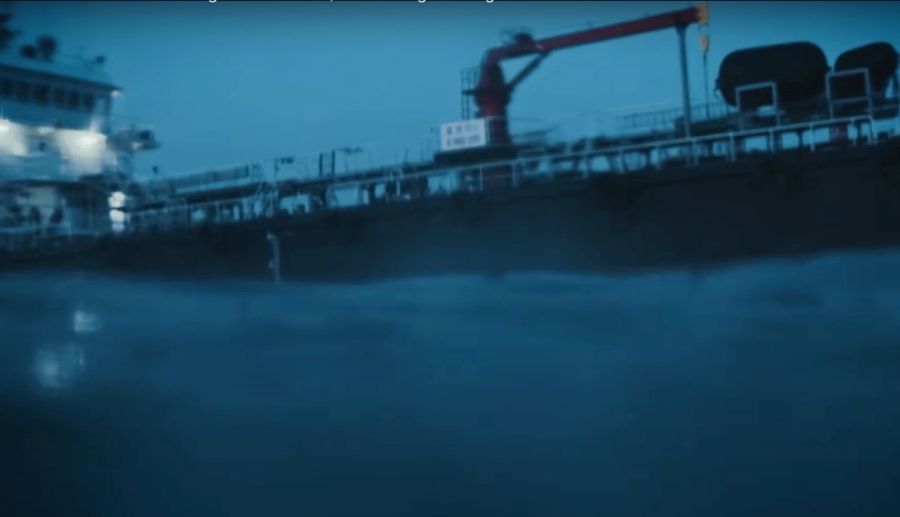The EU needs to tackle the risk of environmental disaster as a consequence of sanctioned countries dodging oil sanctions, especially in light of the recent oil spill off Tobago, argues Alessandro Bertoldi.

Alessandro Bertoldi, Executive Director of the Milton Friedman Institute.
On the 7th of February, the vessel Gulfstream ran aground and capsized, leading to a significant oil spill south shore of Tobago, also causing extensive damage to its coral reefs.
Prime Minister Keith Rowley had to declare a state of emergency.
The situation was further complicated by the revelation that the Gulfstream was uninsured, leading to uncertainty about who would bear the financial burden for the cleanup and compensation for the damage caused.
This incident sheds light on the broader issue within the maritime industry where vessels, especially those transporting environmentally hazardous cargoes, are expected to carry insurance.
Such insurance policies, typically Protection and Indemnity (P&I), are crucial as they cover liabilities including environmental pollution and the costs associated with salvaging a shipwreck.
Insurance thus serves a critical role in protecting not only the interests of third parties but also the environment by ensuring the availability of funds to address any damages.
Sanction measures can restrict the ability of insurers to underwrite certain risks, resulting in limited availability of insurance coverage.
In order to comply with the sanctions, insurers historically include special sanctions limitation clauses in their policies.
Such sanctions-driven policy exclusions are a common market practice, but can result in claim denials.
Sanctions can also lead to delays in claim settlements and represent a serious compliance burden for insurers.
It is unclear whether the policymakers fully understood the unintended consequences of insurance-related sanctions, which may have inadvertently increased environmental risks.
This environmental disaster off Tobago underscores the urgent need for all maritime vessels to be properly insured.
The growing trend of uninsured vessels can be attributed to the attempt by countries like Venezuela, Iran, and Russia to circumvent the international sanctions imposed by the United States and the European Union on the trade of oil.
Despite these sanctions not being endorsed by the United Nations Security Council, they have led to a tightening of insurance provisions, with insurers being pressured to deny coverage on the basis of mere suspicions.
Shipowners obliged to secure insurance are restricted from doing so with western insurers, which dominate the market, if they trade with certain countries, thus violating the sanctions.
The prohibition of insurers to cover vessels deemed “dubious” due to sanctions pressure does not deter these ships from transporting sanctioned cargoes by exploiting loopholes, such as registering in jurisdictions with lax regulations or using outdated documents to bypass restrictions.
This is inevitable when a majority of the world does not participate in the sanction regime and continues to trade with those countries.
It is therefore crucial to find a feasible solution, considering that, on one hand, sanctions cannot be lifted from sanctioned countries, but on the other hand, the existence of this ghost fleet, which is not even insured for restoration in case of environmental disasters, cannot be accepted.
Recent analyses, including a report by the Atlantic Council, estimate that there are around 1,400 vessels currently operating under minimal regulatory oversight, primarily oil tankers employing various tactics to obscure their location and cargo origins.
This has led to an increase in the so-called “shadow fleet” of vessels operating without proper insurance or under dubious practices like disabling their automatic identification systems (AIS), which evade safety protocols designed to prevent at-sea incidents.
This significantly elevates the risk of accidents, thereby putting the maritime industry, the environment, and global safety at risk.
The growing incidence of “ghost tankers” and the corresponding environmental and safety risks highlight a systemic failure within the international shipping industry to effectively manage these challenges.
This scenario underscores the urgent need for a comprehensive overhaul of maritime trade regulations and insurance practices.
Without significant changes, the maritime industry is poised for further environmental catastrophes, emphasizing the critical need for more responsible governance and oversight to safeguard both the environment and human interests.
One of the EU priorities is the Green Deal and the contrast to climate change.
If the EU and the US are unable to involve in the sanction regime the whole world, they should delve into the issue to address these unintended consequences of the sanction regime with respect to this specific aspect.
The Mediterranean is a closed sea, where an oil spill could be an environmental disaster. The EU should do whatever it can to reduce the likelihood of such an event.
Even if the responsibility of an accident was of a ghost tanker, ultimately the Europeans would have to deal with its consequences and cover the full costs of dealing with it.
Click here for more on News & Current Affairs at EU Today
________________________________________________________________________________________________________

Follow EU Today on social media:
Twitter: @EU_today
@EU_sports
Facebook: https://www.facebook.com/EUtoday.net/
https://www.facebook.com/groups/968799359934046
YouTube: https://www.youtube.com/@eutoday1049







